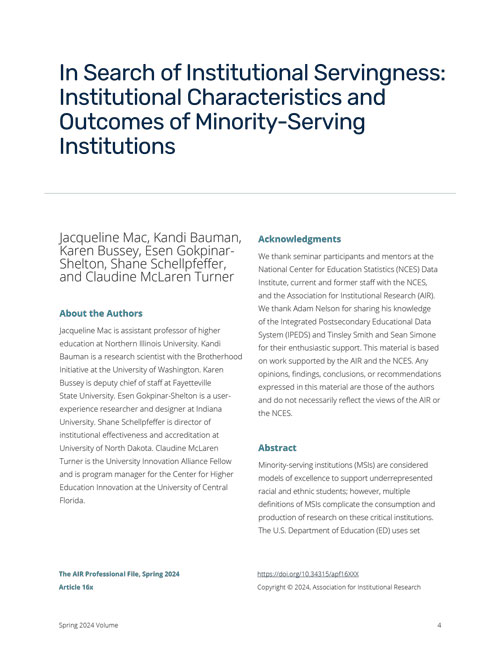The AIR Professional File
Spring 2024, Article 165
In Search of Institutional Servingness: Institutional Characteristics and Outcomes of Minority-Serving Institutions
https://doi.org/10.34315/apf1652024Abstract
Minority-serving institutions (MSIs) are considered models of excellence to support underrepresented racial and ethnic students; however, multiple definitions of MSIs complicate the consumption and production of research on these critical institutions. The U.S. Department of Education (ED) uses set criteria to define MSIs, based primarily on enrollment. However, scholars and practitioners have argued for considering factors beyond enrollment, such as equitable student outcomes and institutional markers of a serving culture. This study used descriptive analyses of IPEDS data to explore the extent to which MSIs served their target population. We use national weighted averages to report results on each MSI category compared to all other institutions. We found that MSIs enrolled higher percentages of MSI-aligned students and employed more-significant percentages of MSI-aligned instructional staff. Most MSIs generally retained higher percentages of MSI-aligned students. Most MSIs showed higher completion proportions, though nearly all MSI categories had lower graduation rates among MSI-aligned students. Some MSIs provided institutional aid to higher proportions of students; others provided lower proportions. Findings confirm that enrollment alone cannot be a proxy for servingness. We encourage researchers, practitioners, and government agencies to use more-holistic definitions. We make recommendations for government agencies to remove burdens to researching MSIs.
Keywords: minority-serving institutions (MSIs), quantitative research, higher education, Integrated Postsecondary Education Data System (IPEDS), secondary data
Authors:
- Jacqueline Mac
- Kandi Bauman
- Karen Bussey
- Esen Gokpinar-Shelton
- Shane Schellpfeffer
- Claudine McLaren Turner
Acknowledgements
We thank seminar participants and mentors at the National Center for Education Statistics (NCES) Data Institute, current and former staff with the NCES, and the Association for Institutional Research (AIR). We thank Adam Nelson for sharing his knowledge of the Integrated Postsecondary Educational Data System (IPEDS) and Tinsley Smith and Sean Simone for their enthusiastic support. This material is based on work supported by the AIR and the NCES. Any opinions, findings, conclusions, or recommendations expressed in this material are those of the authors and do not necessarily reflect the views of the AIR or the NCES.
Copyright © Association for Institutional Research 2024

